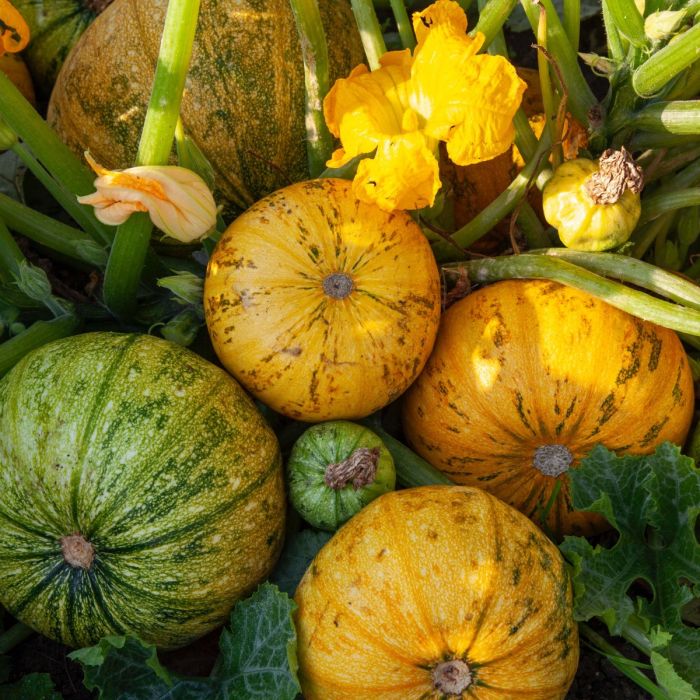Squash Silver Dust Vegetable Seeds
Available weeks
18
19
20
21
22
23
24
25
26
27
28
29
30
31
32
33
34
35
36
37
38
39
40
41
42
43
44
45
46
47
An attractive British bred Winter Squash with unique silver foliage and delicious round fruit ripening from green to orange. Ideal for large patio containers with each plant producing up to 7 fruit which can be stored for several months after harvesting.
€6.00
In stock
An attractive British bred Winter Squash with unique silver foliage and delicious round fruit ripening from green to orange. Ideal for large patio containers with each plant producing up to 7 fruit which can be stored for several months after harvesting.
| SKU | WW-1359 |
|---|---|
| Country of Manufacture | United Kingdom |
| Manufacturer | Plants of Distinction |
| Scientific name | Cucurbita maxima |
| Common name | Squash (Winter) |
| Seeds/packet | 5 |
| Germination (days) | 10-20 |
| Plantavstånd | ca 1 meter |
| Exposure | Full Sun |
| Cultivation Advice | Squashes, Courgettes, Marrows and Pumpkins are all members of the same family and are classified as either summer or winter squash. Squashes come in all shaped and sizes, from massive pumpkins to tiny patty pan squashes. Summer squash has a thinner skin and is quicker to mature than winter squash: some varieties can be picked as early as 50 days after planting. Summer squashes include zucchini or courgettes and marrows. Begin harvesting courgettes when the young fruits reach 10cm long. Picking young fruits encourages the development of more fruits. Leaving the fruits to reach 20-25cm produces a Marrow. To test the ripeness of the Marrow push your thumbnail into the surface near the stalk, if this is easy it is ripe for picking. Winter squash are large, thick skinned and slow growing: their fruit may take from 80 to 120 days to fully mature. In general, the larger the fruit, the longer the time to harvest. Winter squash include butternuts and pumpkins. Winter squash should not be cut until the skin is rock hard. All squash are warm-weather plants that require protection from frost. Squash seeds will germinate best at temperatures of 70° F (21° C) or higher. Ideally squash seed should be sown individually in 3 inch pots, two weeks after last frost. In the UK, late May to early June is the best time to move plants outside, where they can grow on and mature in pots and containers, grow-bags or in beds. The amount of spacing required varies, but a good rule of thumb is to allow 36-60 inches (90-150cm) per plant. |
| Skörd(x) | Skörda när frukterna är 20-30 cm. Gärna ofta så utvecklas nya frukter. |
| Ready to Harvest | Mid |
| Harvest | August |
| Care | Easy |
| KRAV marked | No |
| Brand | Plants of Distinction |
| Kort om odling | Förkultivera i planteringsjord april-maj. Täck sådden med klar plast med lufthål. Håll ca 25 gr tills fröna gror, därefter ca 20 grader. Avhärda och plantera ut efter sista nattfrost. Kan även sås på friland när jorden är +15 grader. Vattna jorden före och håll fuktig tills fröna grott. Trivs på varm, lugn och solig plats i mullrik, välgödslad och väldränerad jord. Vattna rikligt. |
| Plantvård och plantering | Plantera ut efter sista frost. Täck med fiberduk fiberduk för extra värme och skydd. För de flesta växter rekommenderas sk avhärdning. Det innebär att du gradvis under ungefär en vecka vänjer plantorna med uteklimatet genom att skydda dem mot alltför stark sol, vind och kyla. Om du inte kan, vill eller hinner avhärda så försök skydda plantorna genom att täcka med exempelvis fiberduk. Plantera i en kvalitetsjord, gärna ekologisk, som innehåller lera som binder gödsel/vatten som senare tillförs, sand så att jorden blir lucker och rötterna får luft och kompost som tillför näring och mikroorganismer. En bra jord gör att du inte behöver tillföra gödsel under de första veckorna. |
Write Your Own Review

